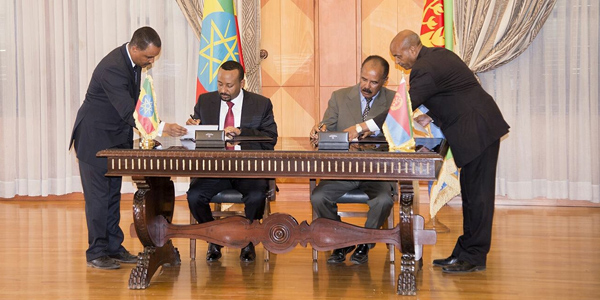Ethiopia’s cardinal this week welcomed the signing of a peace accord between Ethiopia and Eritrea that Pope Francis had already signalled as “historic”.
Ethiopian Prime Minister Abiy Ahmed and Eritrean President Isaias Afwerki signed the peace pact in the Eritrean capital, Asmara, on Monday 9 July that brings to an end 20 years of border conflict between the two countries that has left 80,000 people dead.
Cardinal Berhaneyesus Souraphiel, the Archbishop of the Ethiopian capital Addis Ababa, who was made a cardinal by Pope Francis in February 2015, reaffirmed the Pope’s estimation of the importance of the deal. “This is a historic step taken by the prime minister of Ethiopia within the first 100 days since he took office. The joyous reception of Eritreans to the Ethiopian prime minister and his delegation shows that this has been the prayers of the people. It is very pleasing to the Catholic Church that the prayers of the people of both countries have been answered.”
On Sunday 1 July in his address in St Peter’s Square, Pope Francis had hailed the “good news” of the peace prospects for the conflict that began over a border dispute in 1998, five years after Eritrea gained independence from Ethiopia. “In the midst of so many conflicts, it’s dutiful to point out an initiative that can be called historic,” Francis said, expressing the hope that the governments “speaking together of peace” after 20 years would “turn on a light of hope for these two countries in the Horn of Africa and for the entire African continent.”
Cardinal Souraphiel said the “steps taken so far by both governments prove that Africans have the wisdom to solve their problems themselves.”
The Metropolitan Archbishop of Asmara, Menghesteab Tesfamariam, the President of the Council of the Eritrean Catholic Church, told Vatican Radio: “The news itself was already something great, and now there is this euphoria filled with hope and a lot of expectations.
“My first reaction was, let us pray … we have to pray, so that the Holy Spirit may enlighten the leaders, may give them wisdom, may give them courage and strength to decide for the good of their peoples.”
Cardinal Souraphiel reaffirmed the importance of prayer.
“I thank the Catholic faithful in Ethiopia and Eritrea and those who are in the diaspora for continuously praying for peace. I would like to congratulate them, for we have received answers to our prayers,” the Cardinal said. “This is a first step to sustainable peace, and I ask you to continue praying that with God’s grace this initiative may be successful. I invite all Catholic faithful in both countries to pray for the governments of both countries that God may lead and bless the discussions they are holding.”
On Monday the UN Secretary-General Antonio Guterres, who was in Addis Ababa for the second annual UN-African Union conference, praised the leaders on the signing of the peace pact.
The reconciliation was “illustrative of a new wind of hope blowing across Africa”, he told reporters in the African Union headquarters, stressing that sanctions imposed on Eritrea might become obsolete after the deal. The United Nations has imposed an arms embargo and a partial travel ban on Eritrea, citing its disputes with neighbouring countries, and on Monday Ethiopia asked Mr Guterres to lift the sanctions. In Eritrea’s capital Asmara the day before, Prime Minister Abiy and President Afwerki said the countries would resume trade, economic and diplomatic ties, including reopening embassies and restarting flights.
“There is no longer a border between Eritrea and Ethiopia because a bridge of love has destroyed it,” Mr Abiy said.
Since gaining its independence from Ethiopia, Eritrea has not recorded the same growth as its neighbour, sinking into economic and social isolation. Ethiopia, landlocked since the secession, has a strategic interest in the critical Eritrean port of Assab. With the second-largest population on the continent, it will now seek access to the Red Sea through Assab, to temper its reliance on a port in neighbouring Djibouti.
Eritrean dissidents have accused the government in Asmara of using the war to justify endless military service that has been behind the exodus of young Eritreans in recent years. Eritreans were among the largest group of people landing on Mediterranean shores during the height of Europe’s migration crisis.
The Catholic aid agency Cafod this week issued a statement welcoming the deal and conveyed a message from the charity’s programme manager in Addis Ababa. “The Ethiopian Telecom started direct communication to Eritrea. For 20 years it was impossible to communicate with my family members in Asmara via direct phone conversation!
“Really this was a big unbelievable surprise for all the family who was separated for the last 20 years, especially for those who were not able to travel outside,” the programme manager said.
Ethiopia is one of the most ancient Christian countries - the kingdom of Aksum located in what is now Ethiopia adopted Christianity in the fourth century. Today an estimated 45 per cent of the 90 million population is Ethiopian Orthodox, 19 per cent Protestant, just under one per cent Catholic and 35 per cent Muslim, mostly Sunni Muslim.
Surveys of religious adherence in Eritrea vary, but an estimated 58 per cent of the 6.5 million population are Eritrean Orthodox, 5 per cent Catholic, 1 per cent Protestant and 35 per cent Sunni Muslim.



 Loading ...
Loading ...